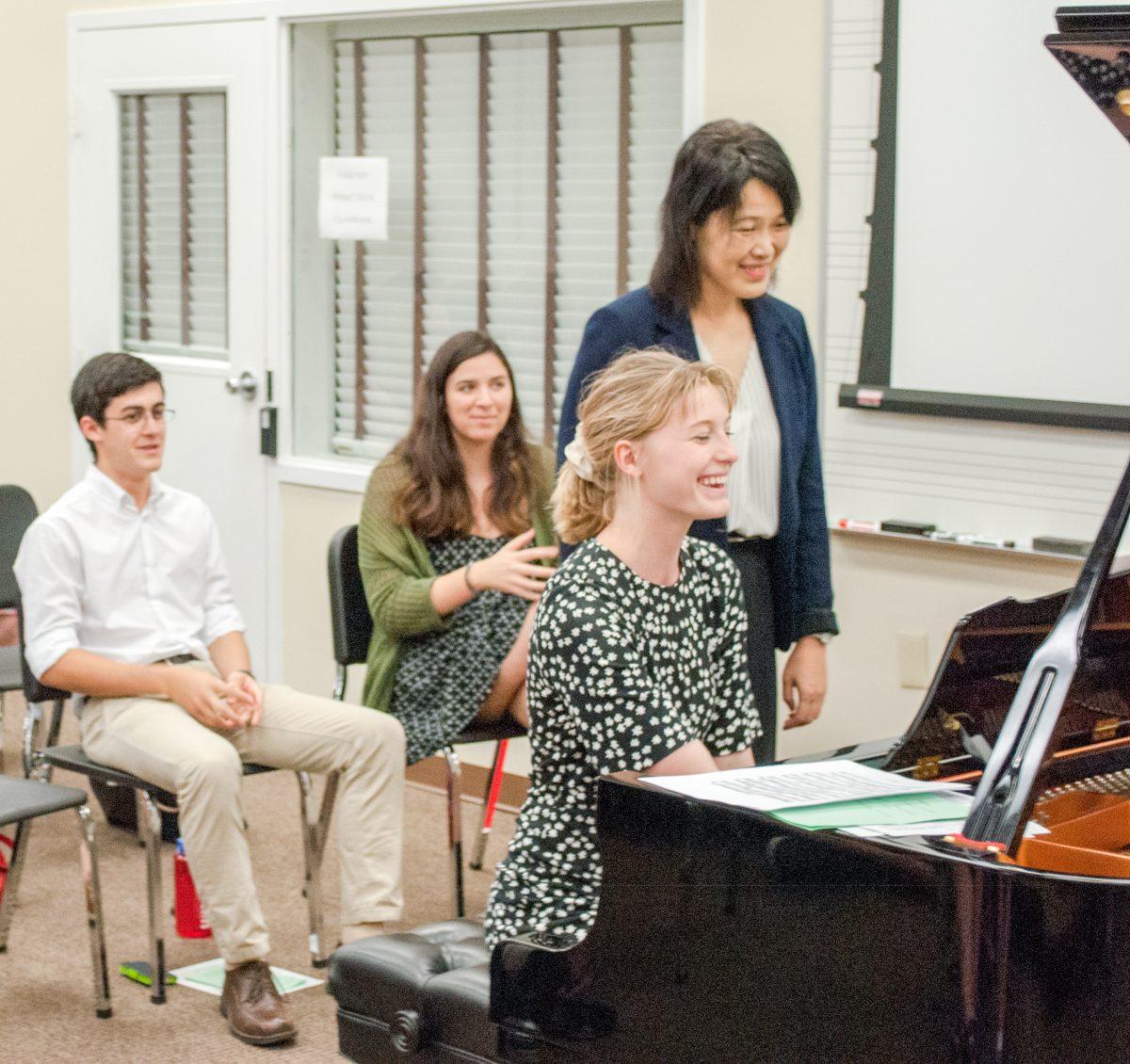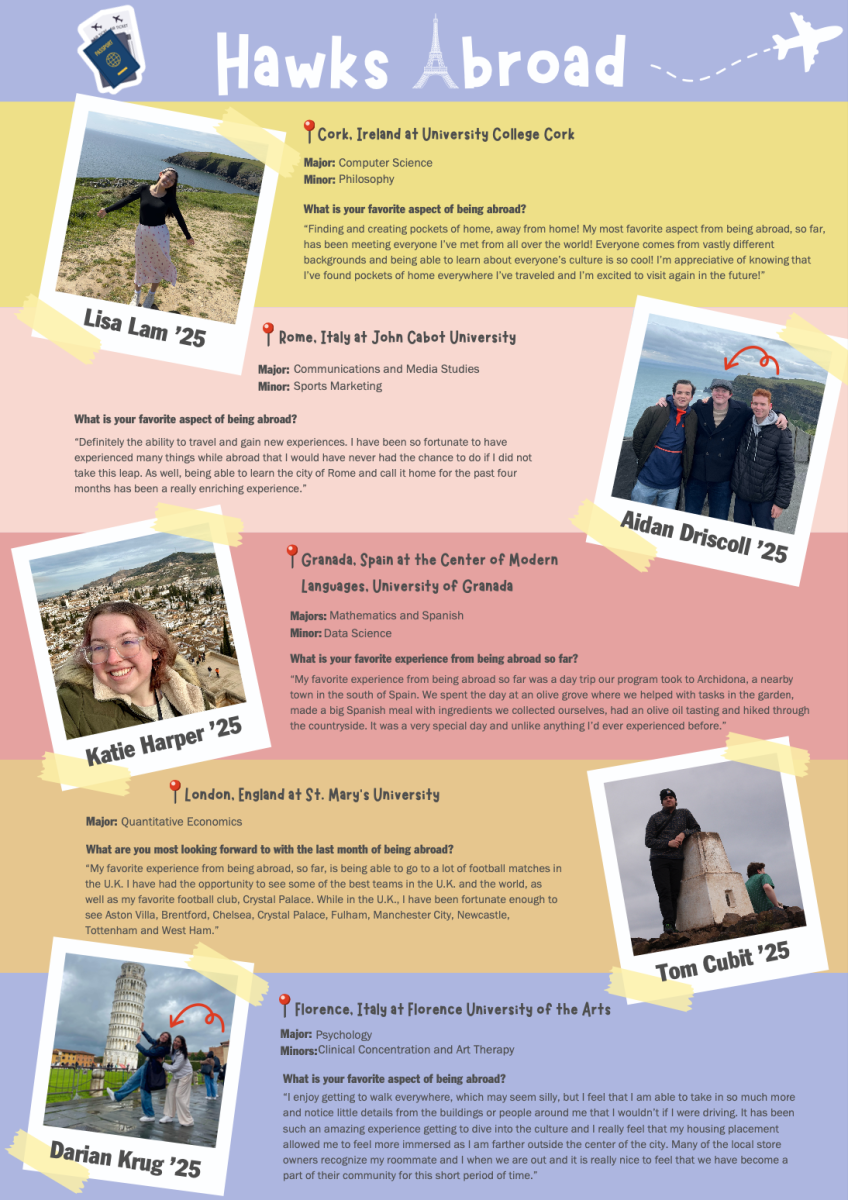Students participate in piano master class.
“Think of having a meeting with someone, except 30 people are watching you.”
Austin Sbarra ’18 was one of three students who participated in a piano masterclass hosted by the St. Joe’s department of music, theater and film on Feb. 20.
In the master class led by pianist Hanchien Lee, students played a piece for Lee by themselves. Then, Lee worked through the piece with the students giving them advice and helping them discover new ways to play it.
“It’s less of a performance in that regard,”
Sbarra said. “I was less concerned with playing every note perfectly or doing all the right things. It’s just someone’s teaching you and you have to respond in the moment in front of people.”
Lee feels master classes are a great learning environment for students who are at different levels in piano playing.
“I think it’s beneficial to both sides: to the performer to have a chance to play in front of an audience and also for the audience to learn something,” Lee said.
Lee planned on spending 20-30 minutes working with each student, and the classes usually lasted about one to two hours. Sbarra sat with Lee for about 40 minutes.
“It didn’t feel like that [long],” Sbarra said. “Especially in the master class, it was different information than I normally get. I don’t know why that makes time go faster, but it was fun.”
Suzanne Sorkin, Ph.D, chair of the department of music, theater and film, asked Lee what advice she could offer to students who have performance anxiety. Sbarra appreciated Lee’s answer to the question.
“What Hanchien said about using your nervous energy to create something greater than you normally would just sitting down to practice and by staying focused on the music, not concentrating on how many people are watching or who’s watching, but staying in the music and creating something you’re really proud of,” Sbarra said.
Jenny Nessel ’19, another of the students in the class, has performance anxiety, but said having someone like Lee can actually be comforting.
“I calmed down as soon as she [Lee] started talking,” Nessel said. “It was less about the audience watching me and more about what Dr. Lee and I were contributing to the music.”
Angelique Frazier ’20, the third student in the class, also felt that with Lee, the audience didn’t seem to matter.
“When I was with her I didn’t really feel like there was an audience in a way,” Frazier said. “There was like less pressure and it felt more intimate and I could focus more on listening to her feedback.”
Lee said when her own students get frustrated, she reminds them that practice is part of learning.
“We all know that nerves play a role in these performances because you’re in front of a public and it’s always nerve wracking to play in front of an audience, so they feel pressured to do it right,” Lee said. “I always encourage them to have a little patience and a little persistence and don’t give up way to easily.”
Frazier felt one of the difficulties of the masterclass was having to change how she plays a piece. However, this was also one of her favorite takeaways of the masterclass.
“Everything she told me was a challenge,” Frazier said. “She gets it that we’re put into this situation where we’ve been playing the piece for weeks, months and we’re used to it. It [the masterclass] kind of refreshed the piece for me because I felt like it’s another challenge, another bar I set for myself with this piece and future pieces.”
The students in the piano classes went to see Lee in a concert hosted by the Philadelphia Chamber Music Society on Dec. 1, 2017 at the Benjamin Franklin Hall. When seeing Lee in concert, Frazier initially felt intimidated by her talent, but still wanted to work with her.
“I’m on my journey with musicianship and I’m working at my level and she’s at a totally different level, but that’s what’s so amazing about the master class,” Frazier said. “It doesn’t matter where you are on your musicianship journey, it’s important to be able to learn from different people.”
Lee, originally from Taiwan, began playing piano at 6 years old. She studied at the Curtis Institute of Music in Philadelphia when she was 11 years old, then earned both a Master of Music degree and an Artist Diploma at Yale University. She got her Doctor of Musical Arts from the Peabody Conservatory of John Hopkins University.
Lee was not as nervous about attending Curtis, but felt going at a young age was an advantage.
“When you’re at that age, you don’t think as much, you worry less,” Lee said. “I think if I were going there at 18 or 19 it must be a very different experience, but I had a great time studying there. It’s one of my pleasures in my life to spend about eight years at Curtis.”
She said she enjoyed studying at Yale as well, but it was a significant adjustment going from Curtis to the Ivy League school.
“At Curtis, it’s a conservatory, it’s a school that only has 175 students, so you see the same people every day,” Lee said. “But at Yale, it’s a whole different world. I took classes that were not music related, but I didn’t have as much time to practice, so it’s a give and take.”
Lee said she could spend hours practicing piano. On busy days, she’s only able to play for an hour or two. But on a free day, she said she goes back to “normal practice hours,” three or four a day.
Lee has played in a variety of locations, including Philadelphia, Washington D.C., New York City, Italy and Taiwan. She frequently performs works by contemporary composers because she wants to keep the classical tradition alive.
“We listen to a lot of music that’s written hundreds of years before – Mozart, Beethoven – but once they were actually new,” Lee said. “When Mozart wrote some of his works, not everybody loved it in the very beginning. We have to give these living composers chances to be heard with the public because all music was once new. It’s very important to advocate their work, so we can continue the tradition.”








































